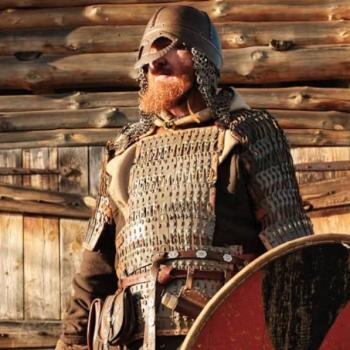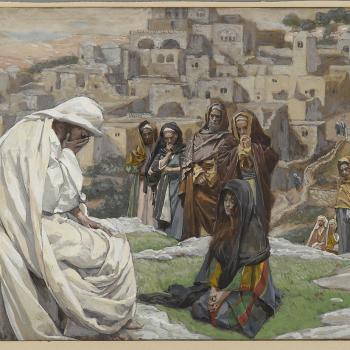I look to the very end of the story of Adam and Eve, when our first parents get some new clothes from God, to find the meaning of the story. It’s not an explanation of the problem of evil or a solution, but God’s compassionate response to our race’s “original sin.”
Episode 2 of the Rowing with Michael Series: A journey through the Jewish/Christian Scriptures in Verse and Commentary. Introduction and Contents for this series HERE.
A verse and a question
Michael, row the boat ashore. Alleluia….
- Eve and Adam made some clothes. Alleluia.
- God walked by and said, “What are those?” Alleluia.
- “Now you have to work until you die.” Alleluia.
- “Pretty big price for some apple pie.” Alleluia.
How did God know that Adam and Eve had eaten the forbidden fruit?
Once I would have answered, “No problem. God knows everything.” But this biblical storyteller in Genesis, Chapter 3, gives us a God who has to figure things out. He observes the people’s new embarrassment at their nakedness and concludes, the way anybody might have, they must feel guilty about something. It’s an unsophisticated concept of God. This very human God also goes for walks in a garden in the cool of the evening to see his friends.
Not like other myths
The story was composed very early. God’s people had not yet developed the concept of the all-powerful, all-knowing God of the psalms and the creation-in-seven-days story. Still it’s a much needed gift even to our presumably sophisticated age. It’s a story about evil, but it doesn’t pretend to explain evil as most ancient myths that I am aware of (and modern people much too often) do. It doesn’t imagine reasons and excuses to make evil sound inevitable or natural or not so bad.
In an African myth, God gives the people a command, which they then disobey and bring evil on themselves. In this story, the command is “Don’t build a fire.” Well, it got cold at night, so they needed a fire to keep warm. The evil that followed was that the animals became afraid and no longer lived peacefully with the people. I can just imagine the people saying, “If God didn’t want us to build fires, he shouldn’t have made the nights so cold.”
A Greek myth about the origin of evil also puts the blame somewhere else than on people. Pandora opened the box from which came all the world’s evils, but only because a god gave her the “gift” of curiosity. Not a bad gift, really; but still it was a dirty trick, putting all those evil things in a very tempting box.
Getting back to the Bible, some Christians mistakenly make the Adam and Eve story into an explanation of evil. They say the snake is a sexual symbol and the first sin was picking the unripe “fruit.” The trouble with that explanation is that the tempter isn’t a snake. At least at the time when it tempts Eve, it walks upright. Only after God’s curse does it crawl on the ground.
Much worse, making the first sin something sexual completely changes the meaning of the story. It makes that first “sin” all too easy to understand and blame on someone else. Didn’t God give us sexual desire?
If you just hear what the story says, you can avoid that misinterpretation; but then you have another issue. You’re tempted to think, “How stupid Adam and Eve are. I could do better.” But we should turn and sympathize with our storied first parents. They merely do what every one of us has done many times—pretend that something we absolutely know isn’t so or doesn’t really matter. This imaginative tale is an entirely realistic look at sin. Sin always includes an element of willful self-delusion.
God’s sacrifice
The Bible story contains one more gift that is essentially Jewish. That is hope. First the story tells it like it is. God says to the serpent,
I will put enmity between you and the woman, and between your seed an her seed; he will strike at your head, while you strike at his heel. (Genesis 3:15)
There’s not much hope there, especially not in the newer, more accurate translation. It’s been called the proto-gospel, the beginning of good news; but it’s not a prediction of a Messianic triumph over evil. It’s more like assurance that we will be able to go on struggling against the evil inside and outside of us. God enlarges the picture with details of the pain and trials the man and woman will go through. The hopeful part comes at the very end, where we see how compassionate God is and, we can hope, always will be toward the ones who just disobeyed him. They covered themselves up in fig leaves, but just before casting them out into the wild, cold world …
- God says, “You can’t go dressed in those.
- You’re gonna need a better set of clothes.”
Or, as the Bible puts it,
For the man and his wife the Lord God made leather garments, with which he clothed them. (Genesis 3:21)
A friend, pastor of the local Assembly of God church, says that particular animal sacrifice was the first blood ever shed in the world. He reads the Bible as inerrant in its literal meaning. I don’t, but I do think his idea makes a meaningful addition to the story. The first sacrifice in the Bible is one that God makes from his beloved creation and offers to the humans, the ones who had just offended him.
















